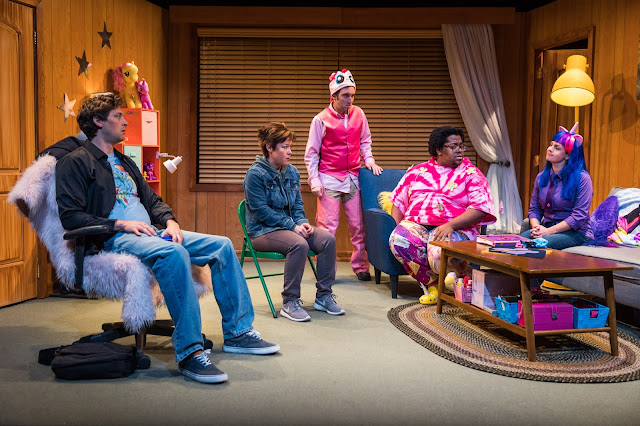Review: “That Pony Feeling” Gets Stampeded in "The Antelope Party"
The Antelope Party
Written by Eric John Meyer
Directed by Jess Chayes
Presented by Dutch Kills Theater at the wild project
195 E. 3rd Street, Manhattan, NYC
November 4-21, 2021 [Update 11/19/21: Extended through December 4, 2021]
 |
| Quinn Franzen, Anna Ishida, Will Dagger, Edward Mawere & Caitlin Morris. Photo by Bjorn Bolinder |
Now, I completely understand the queer attraction to ponies, unicorns, rainbows, sparkles, magic, and all that. But Bronies do not tend to be gay or effeminate. And thank god (!!!) they are not predatory even though they are obsessed with a franchise marketed to girls ages 2-11 and first united on a 4chan forum. They are, as Kevin Fallon says, “Just guys. Dudes. Dudes who like My Little Pony.” That’s fine. I have no issue with that given we are a generation that still goes around asking what Hogwarts house we are in—ok, I am being a little cruel to my fellow Millennials. We all cope with our 80s childhoods in various ways. And while the phenomenon initially focused on men, adult women fans are known as Pegasisters.
This phenomenon is what Eric John Meyer’s play The Antelope Party takes on as a group of committed Brony and Pegasister friends gets torn apart when they begin to see the magic in their friendship replaced by a hellish nightmare. The play opens as friends Shawn (Will Dagger), Doug (Quinn Franzen), Ben (Edward Maware), and Rachel (Caitlin Morris), wearing their pony gear, meet in the the magic circle segment of their playtime in which they can discuss anything without judgement or interruption. Two things are off, though. First, they are joined by a newcomer, Jean (Anna Ishida), and one of their regular members, Maggie (Lindsley Howard), is not there and unable to be reached by phone. They shortly learn both that Jean is just looking for a community to be a part of even though she thinks the pony group is a 9/11 truther group, and Maggie has been kidnapped by a newly formed neighborhood watch.
Once Maggie joins them, they express outrage that she has been kidnapped, but Maggie assures them she is fine and that the neighborhood watch is just looking out for their safety because a lot of “gutter punks” have recently started camping in the area. To shake off the shock of Maggie’s kidnapping, they turn the room into Equestria, the setting for My Little Pony, and continue their pony play. But their playtime is interrupted when they hear a faint galloping that grows louder, clearly indicating that the antelope are coming.
 |
| Will Dagger & Lindsley Howard. Photo by Bjorn Bolinder |
 |
| Edward Mawere & Caitlin Morris. Photo by Bjorn Bolinder |
 |
| Caitlin Morris & Quinn Franzen. Photo by Bjorn Bolinder |
The hollow rhetoric of safety is a big theme of the play. This isn’t surprising for a generation of adults raised to fear everything from Halloween candy to stranger danger and who now find comfort in playing pony. And I think it is obvious this is what Meyer critiques. These are characters who without ponies or antelopes could relate to and help each other cope in truly magical friendships. I asked an audience member after the play their thoughts. They said they could relate to the polarization in it that reflected our own times. They then made the comment that “all attempts at creating utopia end in dystopia.” I disagree. I think sometimes we just have a hard time acknowledging utopia when we are in it. But obsession and the need to mitigate friendships through larger communities, Meyer shows, has nothing but destructive results. Belonging, it seems, can offer a false sense of safety.
-Joseph Donica



Comments
Post a Comment